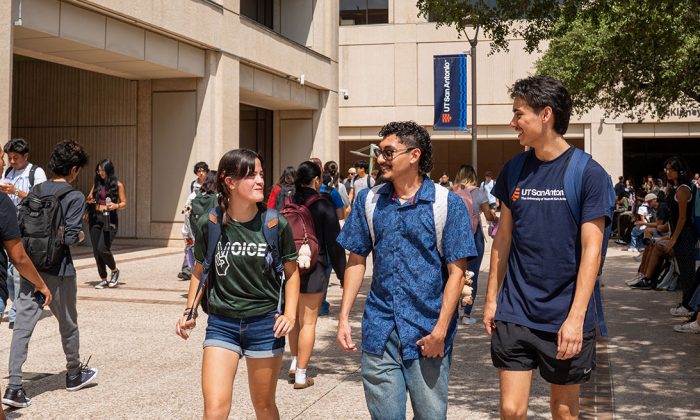A grant from the nation’s largest funder of the humanities will allow the UTSA College of Liberal and Fine Arts to expand a program serving incarcerated scholars in the state.
The National Endowment for the Humanities (NEH) awarded a $100,000 grant to Mel Webb, professor of instruction with a cross-appointment in the Department of Philosophy and Classics and the Honors College, and Alistair Welchman, professor of philosophy. They will use the grant to expand their ongoing Philosophy and Literature Circle (PHILLIT) program.
The NEH implementation grant supports the professors’ work to develop new curriculum modules for the program, enhance existing discussions and create a peer-facilitation training guide designed to support a growing community of incarcerated and university-affiliated learners.
“We are committed to an ongoing practice of presence and excellence with program participants at prisons in our region.” — Mel Webb
Launched in 2019 at the Fabian Dale Dominguez State Jail in west Bexar County, PHILLIT is a public humanities program that brings together incarcerated scholars and university volunteers for sustained, critical conversations centered on philosophy and literature.
The Circles discuss what it means to be human, how to best promote the flourishing of society, and consider questions such as, “What is the good life?”
Scholars at the jail and from UTSA engage with humanistic texts that take up those enduring questions, and in the process, develop skills in critical thinking, logical and ethical reasoning, close reading, interpersonal communication and creative expression.
Plato and Hughes
PHILLIT is rooted in the belief that access to humanistic learning should not be determined by circumstance or confinement.
During the 12-week program, college students and incarcerated scholars exchange their writings, review each other’s papers and engage in discussions over material from authors such as Langston Hughes, Louise Erdrich, Plato and Martin Luther King Jr.
With support from the UTSA College of Liberal and Fine Arts and the UTSA Honors College, the PHILLIT program has completed 12 cohorts at Dominguez, and grown to include regular cohorts at multiple Texas Department of Criminal Justice facilities. In partnership with Judith Norman of Trinity University, it’s also conducted nine Circles at the state’s Ruben M. Torres Unit in Hondo.
During summer 2025, the program is expected to expand to a third site at the Kyle Correctional Center in Kyle, with support from Dwonna Goldstone of Texas State University . The Kyle facility serves incarcerated adults preparing to return to their communities.
“We are committed to an ongoing practice of presence and excellence with program participants at prisons in our region,” Webb said. “I am excited for the possibilities that this grant will open up as we continue to strengthen the Circle according to our core values of compassion, critical engagement, creativity and a spirit of collaboration.”
New Modules and a guide
The NEH-funded expansion will support three interwoven efforts.
The first includes development of three new reading and discussion modules. Each module will explore core themes through humanities texts: Grief in Greek Tragedy and Latinx Short Fiction, Shakespeare in the Borderlands and Freedom and Transcendence in Thoreau and African American Literature.
The second effort consists of three existing modules that will be enhanced: Liberatory Logics in Discussion, Mexica Ethics and The Upanishads and Schopenhauer’s Conception of Compassion.
The project also will establish a new guide designed for alums of the program. The Humanities Discussion Facilitation Training Guide is being created to equip incarcerated participants with the tools to lead discussions with fellow residents, support humanities-based conversations with loved ones and continue their engagement with humanistic inquiry upon return to their communities.
‘Transformative power’
The program’s past success has been supported by three major grants from Humanities Texas, awarded in 2020, 2021 and 2023.
“PHILLIT has grown thanks to the vision and collaborative spirit of educators committed to expanding opportunities for those impacted by incarceration,” said Glenn Martinez, dean of the College of Liberal and Fine Arts. “This NEH grant is a national recognition of the transformative power of this program.”
With the expanded curriculum, the goal of PHILLIT is to continue serving as a model for how public universities can meaningfully engage with diverse communities, including those who are incarcerated.



